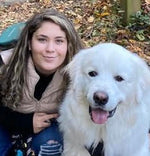 tips
tips
How to Help Calm a Dog with Anxiety
Does your pooch dread going to the groomer’s or vet? Does he or she hide under the bed every time there’s a thunderstorm or fireworks? Is having company over or going on a road trip a source of stress for you and your pup?
If any of the above apply, it may be time to figure out how to help your dog.
What Causes Anxiety in Dogs?
Dogs, just like us humans, can be prone to anxiety. The trigger can be very specific in certain cases (think, loud noises or strangers,) or it may be a generalized problem for your pooch. Studies have shown that nearly 25% of all dogs experience situational or separation anxiety. The factors that affect the mental health of our dogs are complex.
Genetics, environmental stressors, and early life experiences are a few of the main contributors that determine dog anxiety. Some of our puppies may naturally tend to stress out more than others.
Anxiety can also be age-related. As your dog gets older, unfortunately, they may begin to be limited physically and mentally. This can cause them to feel anxious and act out.

How Do You Know If Your Dog Has Anxiety?
Sometimes, the signs of anxiety can be pretty apparent in your furry friend. If they shake and cry excessively when you walk into the vet, that’s a clear sign of situational anxiety. Stressed dog body language, with their tail between the legs, is also a clear indicator.
Not every dog exhibits their anxiety in the same way, however. It’s important to know the signs. Sometimes what we perceive as bad behavior, is really the way a dog is expressing that they're stressed out.
If you’re not sure if your dog is experiencing anxiety, take some time to do a little research, or ask your veterinarian.
The American Kennel Club (AKC) identifies the following symptoms of anxiety:
- Aggression
- Urinating or defecating in the house
- Drooling
- Panting
- Destructive behavior
- Depression
- Excessive barking and/or whining
- Pacing
- Restlessness
- Repetitive or compulsive behaviors
If you’re concerned for your pup and want to find a solution, you’ve come to the right place! Here are three ways to manage dog anxiety.
How To Help My Dog with Anxiety?
1. Early Intervention
If you got your dog as a puppy, there’s a lot that can be done! Early socialization is a crucial part of any dog’s development. It helps diminish fear and anxiety caused by unfamiliar situations. This can be done by taking your puppy to visit new places, meet new people, and play with other dogs (after they’ve received all the necessary vaccinations, of course). By increasing exposure to new environments, dogs are less likely to be scared in new situations.
If you notice your pup is scared of certain triggers, such as the car or the bath, try to work with them and build up a tolerance. Use treats and praise to make these situations positive for them rather than negative. The earlier you start, the easier it will be.
2. Set a Routine
Regardless of age, keeping your pooch in a familiar routine also helps them as well. Dogs recognize structure, and will quickly become familiar with a daily schedule if you follow it consistently. This way, he or she will start to learn that when you leave for work daily, it won’t be forever.
Within their routine, make sure to designate time every day for not only physical exercise, but mental exercise as well. Boredom can leave dogs feeling restless and can contribute to anxiety. Each breed varies in the amount of stimulation they need, so don’t be afraid to do some research.
3. Use a Calming Supplement
Sometimes, there are certain situations or triggers that we simply cannot avoid. In these situations, a calming supplement is a great choice. Almost immediately, calming supplements promote relaxation and decrease stress.
We’ve done the research, and have designed our own Calming Aid Supplement that is all natural, with the most effective ingredients.
It’s specially formulated with a combination of Melatonin, Valerian Root, Passion Flower, L-tryptophan, and L-theanine to naturally calm your dog. It also includes probiotics and thiamine (aka Vitamin B1) to give a healthy boost to their digestive and immune system at the same time.
Dog anxiety can be, for lack of a better word, pretty stressful. But with patience and a little bit of work, you can help alleviate their symptoms and improve their quality of life!
If you are concerned about your pet, please make sure to schedule a visit to a trusted clinic. This text cannot and should not replace advice from a licensed veterinarian. This blog is for educational purposes only.
------
References
Kriss, R. (2021, November 10). Dog anxiety: What dog owners need to know. American Kennel Club. Retrieved June 21, 2022, from https://www.akc.org/expert-advice/health/treating-dog-anxiety/
Table of Contents
- Choosing a selection results in a full page refresh.
- Press the space key then arrow keys to make a selection.


